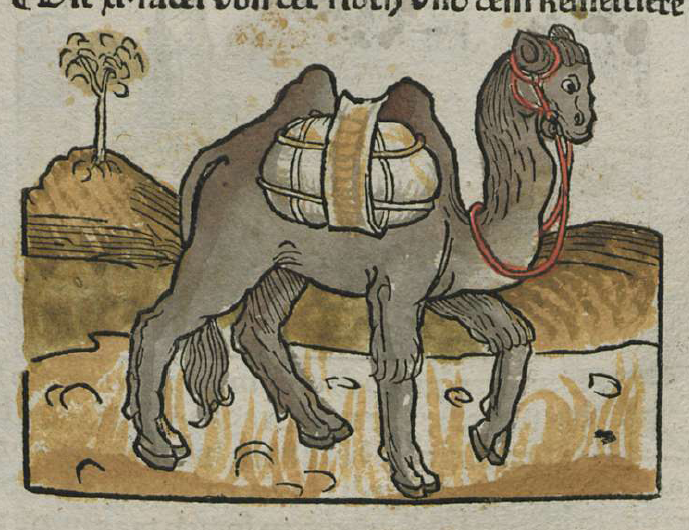I really like this one because it features a camel, and as people know, any evidence of non-European animals in the fable tradition is of great interest to me, especially animals from northern Africa. This is very similar to the same fable told about a gnat and a bull, but now: it's a camel!
Here is the medieval prose version on which Zander's reconstruction is based:
Culex dum forte in cameli dorso morasset cum omnibus sarcinis, deinde saliens, dixit, "Ideo me ocius ad terram mitto ne te atritum gravem." At ille, "Gratum est," inquit, "sed nec imposito te sentire pondus potui nec deposito habere levament." Qui se superiori absque ordine coaequare nititur, in despectu notatus devenit.
20. Pulex et Camelus
Pulex erat cameli dorso in sarcinis.
Ille, inde saliens, dixit, "Ideo me ocius
Ad terram mitto, ne iam te attritum grave."
At ille, "Gratum est," inquit, "sed te nec prius
Impositum sensi, nec nunc deposito levor."
Qui sese aequare superiori nititur,
Merito notatus in despectum devenit.
Here is that poem written out in English prose order to help in reading:
Pulex erat
cameli dorso
in sarcinis.
Ille,
inde saliens,
dixit [camelo],
"Ideo mitto me ad terram,
ocius
ne iam gravem te,
attritum."
At ille inquit,
"Gratum est,
sed non sensi prius
te impositum
non levor nunc
[te] deposito."
Qui nititur aequare sese superiori,
merito notatus
devenit in despectum.
Note that there are two very similar Latin words for the tiny insect in question: it might be a culex (a kind of midge) or a pulex (flea). Zander has opted for pulex. I especially like the detail of how this camel is already laden down with bundles; that makes it even better than the version with the bull who is not carrying a load: since the camel is carrying a load already, a flea hardly makes a difference!
The meter is iambic:
Pulex · erat · came · li dors~ · in sar · cinis.
Ill~ in · de sali · ens, dix · it, "Ide · o m~ oc · ius
Ad ter · ram mit · to, ne · iam t~ at · tritum · grave."
At il · le, "Grat~ · est," in · quit, "sed · te nec · prius
Imposi · tum sen · si, nec · nunc de · posito · levor."
Qui se·s~ aequa · re su · perio · ri ni · titur,
Merito · nota · tus in · despec · tum de · venit.
Here is an illustration from Steinhowel's Aesop because, thanks to the medieval tradition, this fable was part of the Aesop that Steinhowel inherited, and so also Caxton:

De pulice et camelo
Caxton: Of the camel / and of the flee
He that hath no myght ought not to gloryfye ne preyse hym self of no thynge / As reherceth to vs this presente fable of a camele / whiche bare a grete charge or burden It happed that a flee by cause of the camels here lepte to the back of the camel / and made her to be borne of hym all the day And whanne they had made a grete way / And that the camel came at euen to the lodgys / and was put in the stable / the flee lepte fro hym to the ground besyde the foote of the camel / And after she sayd to the camel / I haue pyte of the / and am comen doune fro thy back by cause that I wylle nomore greue ne trauaylle the by the berynge of me / And the camel sayd to the flee / I thanke the / how be it that I am not sore laden of the /
And therfore of hym which may neyther helpe ne lette men nede not make grete estymacion of
[more info]
Caxton: Of the camel / and of the flee
He that hath no myght ought not to gloryfye ne preyse hym self of no thynge / As reherceth to vs this presente fable of a camele / whiche bare a grete charge or burden It happed that a flee by cause of the camels here lepte to the back of the camel / and made her to be borne of hym all the day And whanne they had made a grete way / And that the camel came at euen to the lodgys / and was put in the stable / the flee lepte fro hym to the ground besyde the foote of the camel / And after she sayd to the camel / I haue pyte of the / and am comen doune fro thy back by cause that I wylle nomore greue ne trauaylle the by the berynge of me / And the camel sayd to the flee / I thanke the / how be it that I am not sore laden of the /
And therfore of hym which may neyther helpe ne lette men nede not make grete estymacion of
[more info]
No comments:
Post a Comment
Comments are limited to Google accounts. You can also email me at laurakgibbs@gmail.com or find me at Twitter, @OnlineCrsLady.